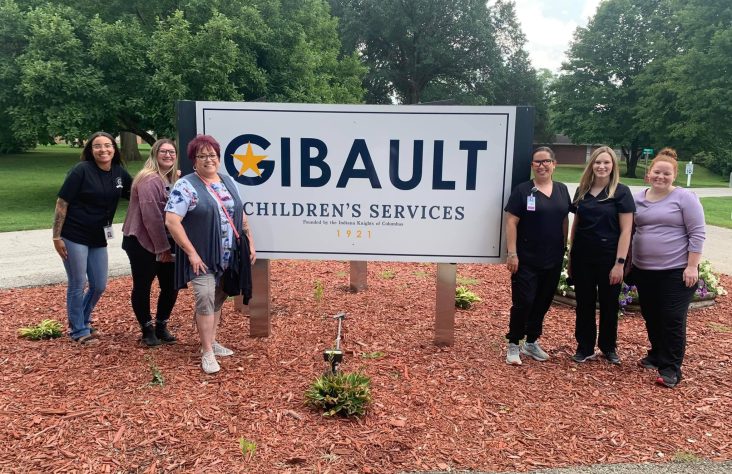August 6, 2019 // Diocese
Diocesan programs aid effort to reduce infant mortality
Adriana Vazquez was a high school senior when she found out she was pregnant. The Fort Wayne woman didn’t know much about being a mom, but she knew she wanted to graduate and go on to college.
Her school referred her to the Education Creates Hope and Opportunity program offered by Catholic Charities in some areas of the Diocese of Fort Wayne-South Bend. The program provides pregnant teens and young adults with the support they need to graduate from high school and become a parent.
“It was really useful for me being a first-time mom,” said Vazquez, now 23, who had a son.
The ECHO program is just one of many ways the diocese and the Catholic community in northern Indiana work to reduce the high infant mortality rates in this area of the state.
“The Church and our diocese take a broad view of what is support for families expecting a child,” said Lisa Everett, the diocese’s director of Marriage and Family Ministry.
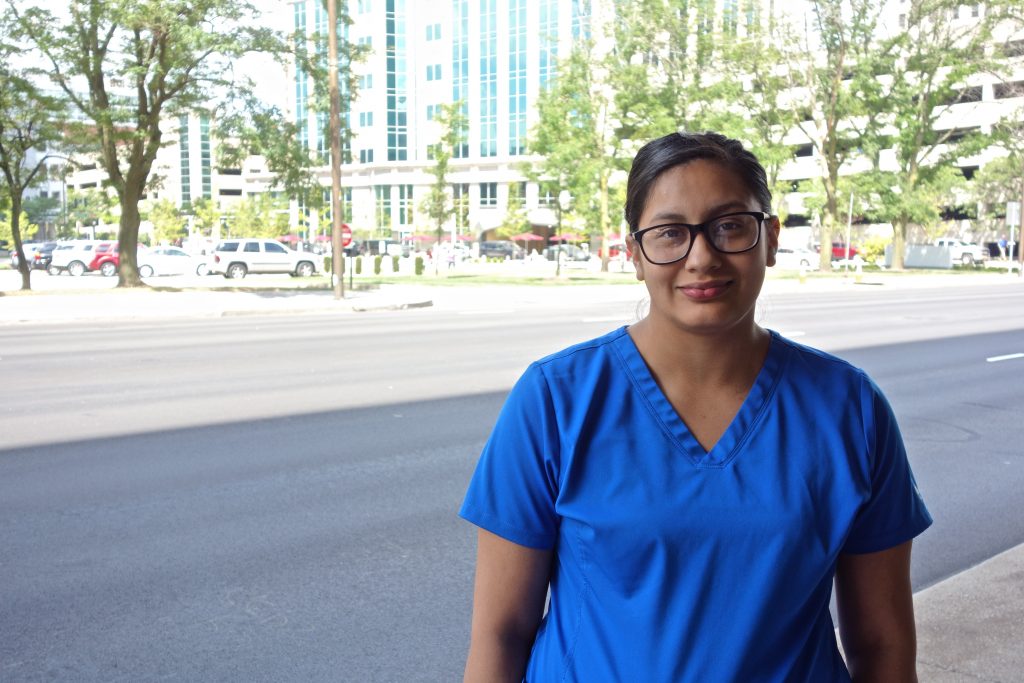
Adriana Vazquez was a senior in high school when she became pregnant. Catholic Charities’ ECHO program helped her have a successful birth, graduate from high school, obtain a job and go on to college. — Kevin Kilbane
The problem
From 2013-17, 677 babies living in counties within the diocese died before age 1, including 137 in 2017, the most recent data available from the Indiana State Department of Health showed. Statewide, 3,029 infants died before age 1 from 2013-17.
A limited number of infant deaths can’t be prevented because of the babies’ health problems. More infant deaths result from factors such as poor prenatal care during pregnancy, early birth, low birth weight or unsafe sleep practices, such as placing an infant on a couch, local social service agency staff members said. A mother’s poverty, limited access to healthy food, alcohol or drug abuse, or lack of safe or stable housing also can contribute to infant mortality.
Infant mortality refers to the number of babies who die before age 1. The infant mortality rate reports the number of infants who died before age 1 per 1,000 live births.
In 2017, Indiana had an infant mortality rate of 7.3, the most recent data available from the state department of health said. That rate exceeded the state goal of 6 and the national rate of 5.8 and ranked 40th worst nationally, the Centers for Disease Control and Prevention’s National Center for Health Statistics reported at www.cdc.gov/nchs.
During the years 2013-17, about 72 percent of infant mortality cases in the diocese occurred in Allen, Elkhart and St. Joseph counties, the largest population centers. In 2017, Allen County equaled the state infant mortality rate of 7.3, while Elkhart and St. Joseph counties exceeded it at 8.4 and 10.3, respectively, state health data showed.
Postal ZIP code areas in Allen and St. Joseph counties also rank among the highest in the state for infant mortality.
The response
The diocese’s work to prevent infant mortality includes direct client work and providing financial or other support to independent nonprofit organizations that help pregnant women and new parents keep their babies safe and healthy.
Among its initiatives, Catholic Charities’ ECHO program likely has the greatest impact. During the past three years, ECHO participants served by the Fort Wayne and South Bend Catholic Charities offices experienced no infant deaths related to infant mortality factors, said staff members Melissa Singh and Nicole Kurut.
ECHO provides a support system for expecting mothers and fathers ages 14-24 by helping young moms attend all prenatal and well-baby checkups and connecting them with resources for food, health care and housing. Expecting parents learn about safe sleep for their baby, infant feeding and parenting and receive help to complete at least their high school education.
“Our goal is always to strengthen families and eradicate poverty,” which is part of Catholic social teachings, said Kurut, Catholic Charities’ mission advancement coordinator.
Helping teen and young adult parents graduate from high school greatly increases their earnings potential during their work career, she noted. About 90 percent of ECHO participants graduate from high school, which is more than double the rate of 40 percent for similar programs nationally, said Singh, Catholic Charities’ community services supervisor.
In the Fort Wayne area, Catholic Charities has offered ECHO since 1999 in collaboration with Lutheran Social Services of Indiana. Catholic Charities’ Fort Wayne office generally serves clients living in northern Allen County, and LSSI assists those in southern Allen County, said Singh.
The Fort Wayne office also provides the ECHO program in Whitley and Huntington counties and hopes to expand to DeKalb, Noble and LaGrange counties, said Singh. The South Bend office offers ECHO in St. Joseph, Elkhart, Marshall and Kosciusko counties.
This past fiscal year, the ECHO program served 81 parents just in Allen County and 41 parents through the South Bend office.
“We love working with young moms and watching them grow,” said Singh. “It’s amazing the barriers they overcome.”
Vazquez’ first caseworker connected her with pregnancy and other resources. The caseworker helped her stay current with school work, provided parenting education and kept her focused on her goal of high school graduation and college.
Today, Vazquez and her husband have boys ages 5 and 4. She works in newborn care at Lutheran and Dupont hospitals and hopes to graduate this winter with a college degree in medical assisting.
She stays in regular contact with her current ECHO caseworker, Natalie Stabler.
“They are really good to talk to or about giving advice or how to take the next step on things,” said Vazquez. “With ECHO, I feel you get a really good friendship.”
For information about the ECHO program, call 260-422-5625 or 574-234-3111.
Other programs
The diocese’s Miriam’s Blessing program, which began in September 2016, provides peer mentors and support for parents who receive a diagnosis during pregnancy that their child has a serious disability or health problem, including those children expected to die shortly after birth. The program encourages parents to celebrate life in all its forms and for however long they have with their child, according to Everett.
About 100,000 couples a year in the United States receive a poor prenatal diagnosis. Past research has shown families who receive solid support are more likely to carry the baby to term than to seek an abortion.
Miriam’s Blessing peer mentors must have some experience with prenatal loss so they can empathize with a family facing a poor prenatal diagnosis, said Everett. “The idea is to provide a listening ear.”
The program has served a handful of families so far. Everett hopes to create more awareness about the ministry in the future. For information about Miriam’s Blessing, contact Everett at 574-234-0687 or [email protected].
The diocese’s office of Marriage and Family also supports organizations that assist pregnant and at-risk women, such as the Women’s Care Center locations throughout the diocese and two maternity homes that serve homeless pregnant women: Hannah’s House in Mishawaka and A Mother’s Hope in Fort Wayne.
The diocese also works with the Indiana Catholic Conference, the public policy voice of the Catholic Church in Indiana, to propose and support legislation at the Indiana General Assembly. The conference supports legislation providing improved prenatal care or other aid to reduce infant mortality, said Everett. “We want to be involved in protecting and promoting human life from the moment of conception.”
The starting point: Support mothers
Organizations that are part of or supported by the Catholic community also work to reduce infant mortality within the Diocese of Fort Wayne-South Bend.
Women’s Care Center
The nonprofit, which receives financial support from the diocese, was founded in South Bend and now operates 32 centers in 11 states. Women’s Care Center has 10 locations within the diocese: three in South Bend, three in Fort Wayne and one each in Plymouth, Mishawaka, Elkhart and Auburn, said Jenny Hunsberger, WCC vice president.
Within the 365 days prior to July 17, WCC centers provided care to 9,968 individual women within the diocese, she said. During the same period, WCC centers nationwide worked with 29,006 women and provided 100,597 office visits.
“Well over nine out of 10 women who come to us choose life,” said Hunsberger.
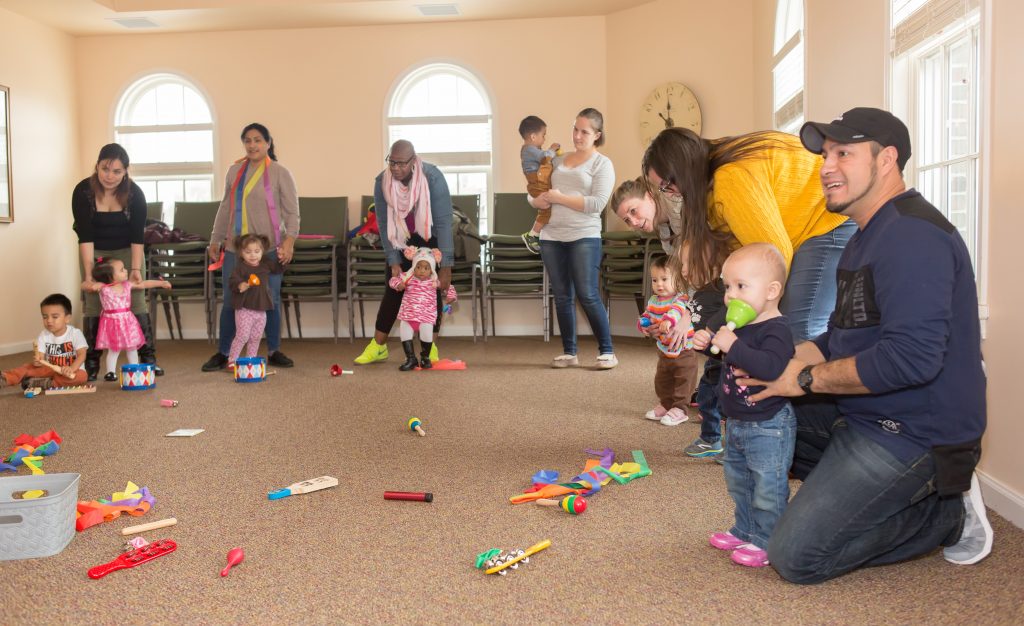
Women’s Care Center locations help prevent infant mortality by offering pregnancy testing and other support, connecting women with prenatal care, and offering a wide range of parenting classes, including this music class for little ones. — Photo provided by Women’s Care Center
Women come for a pregnancy test, ultrasound and pregnancy planning, and they are invited to return at each trimester to ensure they are receiving the prenatal care and the pregnancy and parenting education they need. Moms also can return to WCC after the birth of their child.
WCC offers an extensive array of parenting classes available almost daily at many locations. Most classes are offered in English and Spanish.
In 2017, WCC locations in St. Joseph County served 57 percent of the pregnant women in the county, a WCC fact sheet reported. That includes at least 90 percent of both teen and unmarried mothers and 78 percent of African American mothers.
“When women come to the Women’s Care Center more often, the average birth weight (of their baby) increases by 6 ounces,” said Hunsberger. “That’s a tremendous difference for the health of a baby.”
She believes the improved birth weights result from the encouragement women receive at WCC to get prenatal care. Staff also advocate for and help women with individual goals and concerns, such as applying for Medicaid, finding housing and breastfeeding.
“Probably more important is the empowerment clients feel,” said Hunsberger.
When women first come in, they are met with care and compassion and not judgment, she said. Staff members believe each woman is uniquely qualified to be the mother of her future baby. “That inspires people,” said Hunsberger.
For information, call the helpline at 877-908-2341.
A Mother’s Hope
Since its opening in October 2018 through mid-July, A Mother’s Hope has served 14 homeless pregnant women ages 19-36 who have had seven babies, said Stasia Roth, executive director.
The nonprofit can house as many as eight women and their babies at a time. Women can stay in the program for up to one year after their child’s birth.
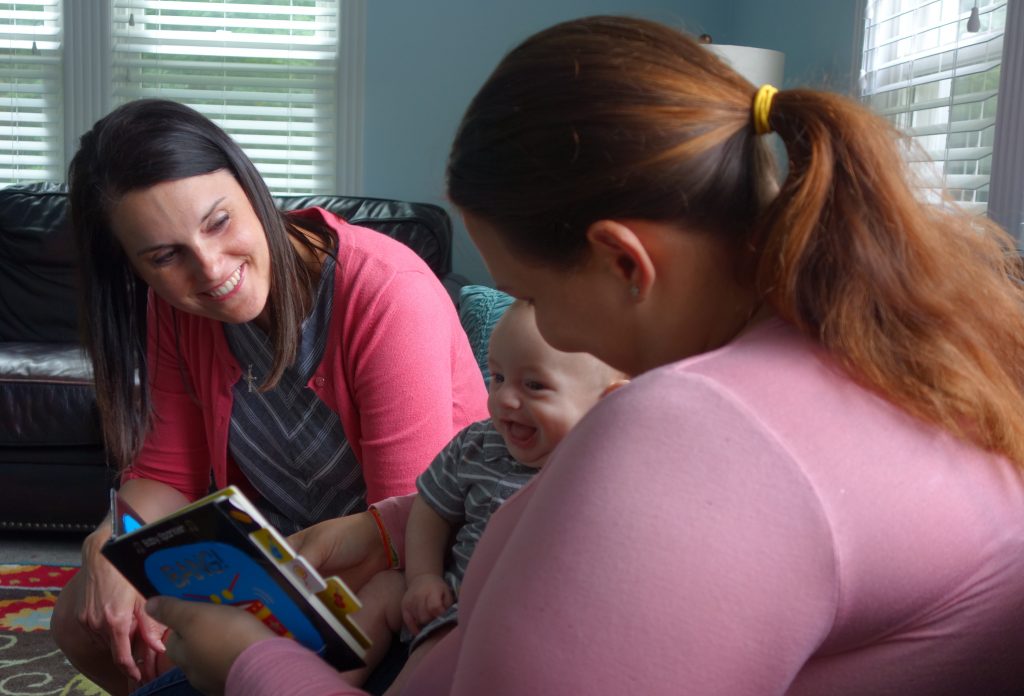
Homeless women who are pregnant learn parenting, infant care and other skills at A Mother’s Hope maternity home, which was founded by Stasia Roth, left. The program helps women prepare for the birth of their child and for the eventual transition to living on their own. — Kevin Kilbane
To be eligible for A Mother’s Hope, a woman must be pregnant and homeless or at risk of being homeless or not having a safe place to stay, Roth said. Women also must meet income requirements and stay drug- and alcohol-free.
Except for a brief period after the birth of their child, women also must put in 40 hours of productivity per week, which can include chores at the shelter, attending classes or working at a job in the community, she added.
Staff, who are awake and on duty 24 hours a day, seven days a week, also provide a lot of one-on-one support to moms. That includes ensuring the mother and baby stay healthy, educating moms about parenting, and helping them pursue an education. Staff also work with women on finding employment and child care and making the transition to living on their own.
The work is grounded Christian love, said Roth, who is Catholic.
“When I felt called to do this, there was so much pain and suffering in the world, and I asked (God) if I could help stop it. For me, this is our way of bringing women to Him. That is where they will find their joy and hope.”
The organization has received funding and other support from the diocese, St. Joseph Community Health Foundation and the Mary Cross Tippmann Foundation. Bishop Kevin C. Rhoades appoints a member to the A Mother’s Hope board of directors, which includes several Catholic members.
For information, call 260-373-0097 or go to www.amothershopefw.org.
Hannah’s House
The diocese worked with Bethel University, Women’s Care Center and St. Joseph Health System, all in Mishawaka, to found Hannah’s House 26 years ago in Mishawaka.
The Christian, nondenominational maternity home serves women of all ages who are homeless and pregnant, said John Meiser, Hannah’s House executive director. Most clients come from the Michiana area, but the home accepts applications from women outside the region.
“We as an organization empower pregnant women facing homelessness to begin a process of transformation,” said Meiser. Staff believe the transformation takes place through Jesus Christ, but women don’t have to be Christian to apply for the program.
The staff determines what each woman needs to become successful as a person and parent, said Meiser, who believes access to the program has encouraged some women to give birth rather than seek an abortion.
The maternity home can accommodate seven women and three babies at the same time, he said. Women can stay up to one year in the maternity home, including up to four months after their baby’s birth.
Moms who complete the maternity program, have a job and arrange child care can move into Hannah’s House’s transitional home, where they can live for up to one year. While in the transitional home, they begin paying income-based rent, develop a personal spiritual plan and learn about finances.
Hannah’s House helps prevent infant mortality by emphasizing preventive health care, said Meiser. The maternity and transitional homes are a block away from a medical clinic, so staff can get moms and babies to a doctor quickly if needed.
Staff members teach moms about safe infant sleep practices and how to care for and feed a baby. Staff do bed checks two or three times a night on both moms and babies.
He believes the family stability provided by Hannah’s House also helps reduce infant mortality.
Hannah’s House relies completely on donations for its funding. The diocese, its parishes and Catholic community are important contributors to its operation.
For information on Hannah’s House, call 574-254-5309 or go to www.hannahshousemichiana.org.
Foundation support
Two Catholic-based foundations in Fort Wayne, the St. Joseph Community Health Foundation and the Mary Cross Tippmann Foundation, invest significantly in organizations working to prevent infant mortality.
“We are involved because we want to love the mother and the baby,” said Meg Distler, SJCHF executive director, who said preventing infant mortality is the foundation’s No. 1 priority. Women shouldn’t feel so stressed they choose to abort a pregnancy, she said.
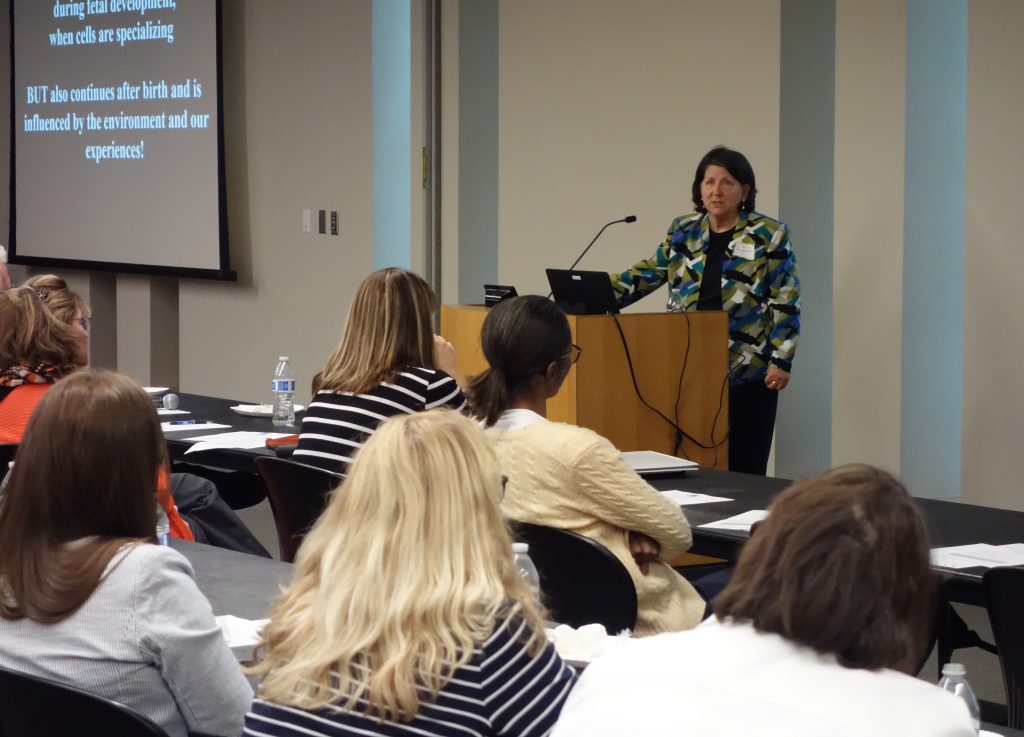
Dr. Nancy Swigonski, a professor at the Indiana University School of Medicine and a pediatrician at Riley Children’s Health, both in Indianapolis, spoke at the May Prenatal & Infant Care Network quarterly meeting in Fort Wayne. The St. Joseph Community Health Foundation helped organize the network and provides funding support in its effort to prevent infant mortality in Allen County. Network meetings include presentations and panel discussions by experts and an opportunity for social service providers to build collaborations.
To help pregnant women and mothers get the array of support services they need, the foundation provides funding to a range of social service organizations working to prevent infant mortality. It also helped start the Prenatal & Infant Care Network in Fort Wayne, which has about 260 social service agency staff members on its mailing list. Quarterly network meetings provide an opportunity to learn from experts and to build collaboration among various agencies and their staffs.
The Mary Cross Tippmann Foundation provides funding to several organizations that help prevent infant mortality, including Women’s Care Center, A Mother’s Hope, Hannah’s House, the Christ Child Society and Safe Haven Baby Boxes, said Cheryl Chalfant, foundation executive director.
“We also support a number of organizations that assist families with their needs for food, shelter and medical attention,” Chalfant said in an email. “While these programs may not be specifically directed toward reducing infant mortality, we find that supporting families with healthy food, routine medical attention and safe shelter improves the overall health of moms and babies during pregnancy and beyond.”
The best news. Delivered to your inbox.
Subscribe to our mailing list today.




